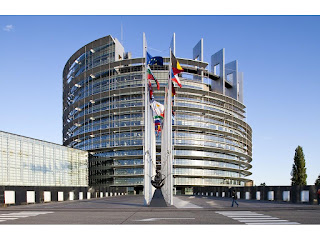 |
| The European Parliament |
I wrote to you all in early April regarding the proposed Copyright Directive. Unfortunately, I had constructive engagement only from David Martin. The matter is now urgent, since you will be voting next week; so I shall try again to state my case.
The proposed copyright directive:
1. Undermines the modern economy
2. Undermines internet security
3. Reduces the rights of citizens
4. Undermines civil society
I'll expand briefly on each of those points in turn.
The modern economy is built largely on the Internet, which in turn is built largely on open source software. Without open source, none of email, the World Wide Web, Facebook, Twitter, or thousands of other services the modern economy depends on would not be possible at all. Open source is software created and given away at no cost: a gift to the public commons. It is created by academics and corporations, but primarily by individuals. There's no profit made from this; consequently, it is extremely vulnerable to costs. Open source software is shared on sites like Github and Sourceforge, which in turn make little profit. Content upload filters will literally kill the golden goose.
Internet security is both based largely on open source software and requires the sharing of highly techincal information about software vulnerabilities. Many people - both individuals and in academia and businesses, across many countries, co-operate to identify and find fixes for vulnerabilities. Consequently, the information shared almost inevitably includes exerpts of proprietary material. Again, content upload filters would stop this activity stone dead.
Citizens have a right to freedom of expression and freedom of creativity. Art has always involved building on other art. No tune, no picture, no movie is completely unlike any other, and knowing reference to other creative productions, either as homage or as satire, is a trope in every sphere of human expression. Snow White, Cinderella and Pinochio were folk tales in the information commons of Europe long before the Victorians gathered them into books and Walt Disney monetised them into movies. The whole principle of long term copyright is an abuse against freedom of expression.
Civil society involves debate, much of which, today, happens online. To comment on and either expand or rebut the arguments of other voices in the debate requires both quoting and referencing, both of which fall foul of the proposed directive. The citizens right of civic engagement will be gravely damaged.
You'll note that in the above argument I've made no comment on the feasibility of building foolproof content filters as envisaged in article 13. As a software engineer, I know that filters of the quality and subtlety required cannot be built, but that is beside the point. Even it they could be built, the social and economic costs of deploying them would be vastly damaging, not simply to Europe but to the world.
I urge you in the strongest possible terms to reject the proposed Copyright Directive in its entirety.
Yours sincerely,
Simon Brooke
No comments:
Post a Comment